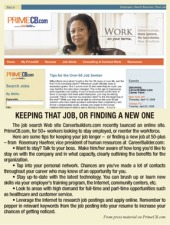Think about an encore

New web sites help 50+ jobseekers find employment
Last month, when PRIME asked readers to begin thinking about how they wanted to spend their time, we mentioned the idea of working part time or launching a second career in retirement.
But, where do you begin?
According to Allyn Freeman, co-author of "Reworking Retirement," think contacts, think clubs and organizations, think networking to find that next career or supplemental job.
"Finding a job . 40 percent of that will come from networking, and those stats are not just for retired people, but for all job seekers," he said. "So many [retired] people have been working for so long, the last time they looked for a job was 20, 30, 40 years ago, and then they went to a headhunter."
And when Freeman says "network," he doesn't mean just pulling out those old business cards and calling past colleagues and former associaties.
"Family, church, civic organizations like the Elks Club, your golf club, the PTO . anybody where you have a list of people is a valid contact . everybody is a potential contact," he said. "either you get a reply, or you don't."
And Freeman said not to overlook overlook the contacts of family members.
"By that age you have children and grandchildren. Let everyone know you're looking for work," he said. "The key step is to send it out to everybody; your son or daughter or grandchild might now somebody who's looking for [just what you can do]."
The easiest way to make these contacts today? Freeman said do it by e-mail.
And once you've got that job interview, remember, especially for a part-time job, they don't need to know everything about what you did in your past career.
"Play into the agenda of the person who is hiring you," Freeman said. "Maybe you were the 'admiral of the fleet,' and now you're interviewing for the position of box boy; pare down your abilities . you don't want to be demeaning and say 'well, I ran so-and-so.'"
Instead, Freeman said older job applicants should think about what kind of skills the interviewer will be looking for.
"This is where people [of retirement age] have wonderful work skills; they put in the hours, they have a good work ethic, etc," he said.
Once you have the job, Freeman said make sure it works for you, too. That means the hours, the environment, even the pay, need to meet your needs at this stage in life.
"It's not a career for you, it's not defining you," he said. "If you don't like it [and you don't need the income], leave!"
